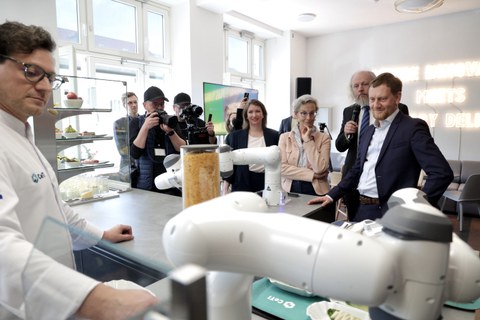Apr 15, 2024
CeTI Cluster of Excellence at TU Dresden opens unique "robot kitchen" as a research lab for human-machine interaction

CeTIBAR: Minister President Michael Kretschmer, TUD Rector Prof. Ursula M. Staudinger and spokesperson of the CeTI Cluster of Excellence Prof. Frank H.P. Fitzek at the opening of the "robot kitchen" with the celebrity chef Benjamin Biedlingmaier.
Today, April 15, 2024, the Cluster of Excellence Centre for Tactile Internet with Human-in-the-Loop (CeTI) at TUD Dresden University of Technology (TUD) opened the CeTIBAR in the Barkhausen Building, a unique research laboratory that brings the capabilities of collaborative robots ("cobots") to life in an impressive way. The opening was attended by Saxony's Minister President Michael Kretschmer, Minister of Science Sebastian Gemkow, TUD Rector Prof. Ursula M. Staudinger and Michelin star chef Benjamin Biedlingmaier. The gourmet chef demonstrated the possibilities offered by the combination of top-class cuisine and cutting-edge research.
The interaction between humans and machines is being researched in the ultra-modern robot kitchen facility. Thanks to the direct presence of the cobots, the CeTIBAR is also an inspiring venue where the results of innovative cutting-edge research can be seen.
Highly innovative knowledge transfer - Real-world laboratory for human-robot interaction
"TUD's CeTI Cluster of Excellence is a pioneer and driver of innovation in the field of human-machine interaction. This research is of fundamental significance for the tech-assisted societal participation of all and the economic development of Dresden and Saxony," explained TUD Rector Prof. Ursula Staudinger. "With the CeTIBAR, we are inaugurating a living lab and a highly innovative place for science transfer on our campus. This place brings robotics and the future of the tactile internet to life - a milestone on the path to democratizing skills and abilities," added the Rector.
"With the CeTIBAR, we have created a place where researchers can collaborate across disciplines and test their ideas in society," said Prof. Frank Fitzek, spokesperson for TUD's CeTI Cluster of Excellence and holder of the Deutsche Telekom Chair of Communication Networks. The CeTIBAR serves as a dynamic real-world laboratory for researchers from the Cluster of Excellence. At the CeTIBAR, researchers get to the bottom of the question of how we will learn in the future or how robots will change our professional world.
Combining cuisine, research and socializing - Promoting understanding of new technologies
At the inauguration, star chef Benjamin Biedlingmaier gave a demonstration of his culinary skills in combination with robotics - while he created a dish, the machines prepared, decorated and served it. "The cobots take over repetitive tasks, leaving you more room for creativity. The idea behind it is not to replace the chef, but to support them in times of a shortage of skilled workers," he pointed out.
The CeTIBAR is intended to develop into a lively hub for scientific engagement and participative interaction: "Here, at the heart of TUD's main campus, we will be able to promote dialog and awareness of new technologies. We want to inspire the next generation of innovators through interactive exhibits, workshops and lectures," explained Doreen Böttcher, science communicator at the CeTI Cluster of Excellence. Science communication plays a key role in teaching and research at the Cluster of Excellence, particularly with regard to the promotion of women and girls in the STEM field.
This unique facility is not only relevant for research, but serves as a meeting place for students, teaching staff, early-career researchers and guests of the university. For the next opening times of the CeTIBAR, please go to www.ceti.one/cetibar
Background: CeTI Cluster of Excellence:
The Centre for Tactile Internet with Human-in-the-Loop Interaction is a Cluster of Excellence at TU Dresden. In the future, people will be able to interact in real time with robots or machines in both the real and virtual world. The aim of the research is to democratize access to skills and expertise in order to promote equal opportunities for people of different sexes, ages, cultural backgrounds or physical limitations. Researchers from the fields of electrical engineering, computer science, mechanical engineering, psychology, medicine and neuroscience are working together on an interdisciplinary basis to create the foundations for new applications in medicine, industry and the Internet of Skills.
For more information, please go to: https://ceti.one/de/
TUD Dresden University of Technology:
As a University of Excellence, TUD Dresden University of Technology is one of the leading and most dynamic research institutions in Germany. With around 8,300 members of staff and 29,000 students in 17 Faculties, it is one of Europe’s largest technically-oriented universities. Founded in 1828, today it is a globally oriented, regionally anchored top university, developing innovative solutions for the world's most pressing issues. In research and academic programs, the university unites the natural and engineering sciences with the humanities, social sciences and medicine. This wide range of disciplines is an outstanding feature that facilitates interdisciplinarity and transfer of science to society.
Contact:
Doreen Böttcher
Public Relations
Tel.: +49 351 463-40407
Mobil: +49 160 963 77019
